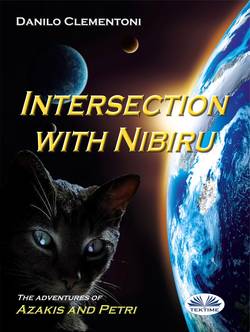Читать книгу Intersection With Nibiru - Danilo Clementoni - Страница 11
Theos spacecraft - The superfluid
ОглавлениеThe image of the object that Petri had placed in the space between Kodon and earth had left both terrestrials flabbergasted.
"And what's that thing?" asked Elisa curiously, as she went nearer to try and see better.
"We still have not given it an official name." Petri brought the strange object back into the foreground again and watching the doctor, he added "Perhaps you could choose one."
"If you could at least explain what it is, I might perhaps try."
"Our best scientists have been dedicated to this project for some time now." Petri clasped his hands behind his back and began to slowly walk around the room. "This equipment is the result of a series of studies that, partly, go even beyond my scientific skills."
"And I can assure you they're remarkable," Azakis added, giving his friend an affectionate pat on the back.
"In a nutshell, it's a sort of anti-gravity system. It's based on a principle which, as I said, is still being studied but which I can try to summarise in a few simple words."
"I think that would be much better," commented Elisa. "Don't forget we belong to a species which, compared to yours, could easily be defined as underdeveloped."
Petri nodded slightly. Then he approached the three-dimensional representation of the strange object and calmly continued his explanation. "This - what you called a âdoughnutâ earlier - is geometrically defined as a toroid. The tubular ring is hollow, while what we might simply call the âcentral holeâ contains the propulsion and control system."
"Up to here it's all clear," said Elisa, ever more excited.
"Very good. Now let's see the system's principle of operation." Petri spun the image of the toroid around and showed its inner section. "The ring is filled with a gas, usually an isotope of helium which, cooled to a temperature close to absolute zero, changes state and turns into a liquid with very particular characteristics. In practice, its viscosity becomes almost null and it can flow without generating any friction. We call this characteristic 'superfluidity'."
"Now I'm getting a little lost," said Elisa sadly.
"To put it simply, this gas in its liquid state, appropriately stimulated by the ring's structure, will be able to travel inside it, without any difficulty, at a speed close to the speed of light, and manage to maintain it for a theoretically infinite time."
"Amazing," was all Jack could comment, who hadn't missed even a syllable of the whole explanation.
"Okay, now I think I've understood," added Elisa. "But how will this gadget counteract the effects of the gravitational pull between the two planets?"
"This is where things become much more complicated," replied Petri. "Let's say that the rotation of the superfluid at speeds close to those of light, generates a space-time continuum curvature around it, causing an anti-gravity effect."
"Good grief!" exclaimed Elisa. "My old physics professor will be turning in his grave."
"And not only him, my dear," added the Colonel. "If I have rightly understood what these two gentlemen are trying to explain to us, here we are talking about toppling a good many theories and concepts that several of our scientists have spent their entire lives trying to analyse and study. The principle of anti-gravity has been theorised more than once before but nobody has ever been able to prove it completely. Now we finally have the proof, here in front of us," and he pointed at the strange object "that it really is possible."
"I'd be a little more cautious," said Azakis, dampening the Colonel's excitement a little. "I feel obliged to inform you that this thing has never been tested on large objects like planets, or rather, we tried it two cycles ago but it didn't turn out exactly as we expected. Moreover, events might occur that we have not anticipated and..."
"There you go, bringing bad luck as usual," said Petri interrupting his companion. "The mechanism has been demonstrated more than once. Our own spacecraft uses part of this principle for its propulsion. Let's be optimistic for once!"
"Because there don't really seem to be many alternatives anyway, or am I mistaken?" asked Elisa in a disappointed voice.
"Unfortunately, I don't think so," said Petri disconsolately, with his head hanging down slightly. "In fact, the only thing I really fear is that, given the reduced size of our toroid, we will not be able to completely absorb all the effects of the gravitational pull and a part of the gravitons will manage to do their work all the same."
"Are you saying that this thing might not be sufficient to prevent a catastrophe in any case?" asked Elisa approaching the alien threateningly.
"Perhaps not completely," replied Petri taking a small step backwards. "From my own calculations, I would say that about ten percent of the gravitons could escape this kind of ploy."
"So, it could all be wasted effort?"
"Not at all," answered Petri. "We'll reduce the effects by ninety percent. There'll be very little left for us to manage."
"We'll call it 'Newark'," said Elisa satisfied. "Now we'd better get a move on. Seven days go by quickly."
